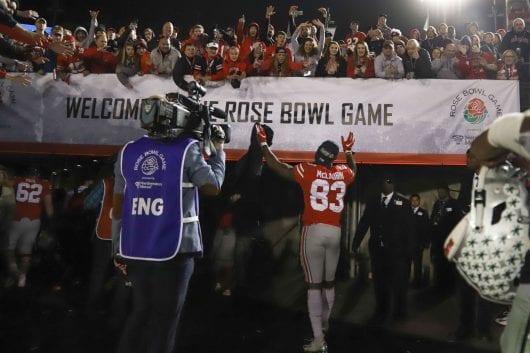
Ohio State redshirt senior wide receiver Terry McLaurin (83) waves to fans as he leaves the field following the Rose Bowl Game featuring Ohio State and Washington in Pasadena, Calif. on Jan. 1. Ohio State won 28-23. Credit: Casey Cascaldo | Photo Editor
PASADENA, Calif. — Ohio State’s 28-23 Rose Bowl win against Washington marked the end of the Urban Meyer era after seven years as the Buckeyes’ head coach.
It also marked the end of a different era.
The era of Parris Campbell, Johnnie Dixon and Terry McLaurin: a trio of wide receivers that have been a part of the team for five of Meyer’s seven years.
The three redshirt seniors, who were all named captains in 2018, finished their final game in an Ohio State uniform the same way they started it: together.
“We have a great relationship, same class, we came in together, when we were younger is when we started the relationship, and as the years went on it grew more and more,” Dixon said. “Being back, being fifth-year guys, knowing that we had a lot of responsibility on us, you know, kind of helped our friendship become better, so I just love those guys and I’m excited to see what their future holds for them.”
Coming into their final season, the trio combined for 118 catches, 1,733 yards and 19 touchdowns through the first three seasons at Ohio State.
Campbell, McLaurin and Dixon leave Ohio State combining for 167 catches, 2,433 yards and 31 touchdowns in the last 14 games of their collegiate careers.
“We’re leaving a legacy,” McLaurin said. “We took Zone 6 to new heights, statistically, characteristically, we’ve left big shoes to fill, but the guys behind us are ready to take that next step and be the next generation of great wideouts to come out of Ohio State, so I have no doubt they’re gonna keep the tradition going and make it even better.”
One of the receivers expected to step up is freshman wide receiver Chris Olave, who found a more expansive role toward the end of the season after junior Austin Mack went down with a season-ending foot injury.
Olave said the trio helped him during the middle of the season when he was going through issues both on and off the field, and that their presence will be missed next season.
As McLaurin said, Olave believes that they have created a legacy in the wide receiver room.
“They’re leaving behind a legacy on and off the field,” Olave said. “On the field, they’re great, but off the field they’re even better, so to not have them in the room it’s going to be different, but we’ll have to get used to it.”
Campbell led Ohio State in receptions, yards and touchdowns, finishing the season with 90 receptions, 1,063 yards and 12 scores. The receptions is a program record, and he is just the fifth Ohio State receiver to ever break 1,000 yards in a season.
But when you ask Dixon, it didn’t start out that strong for Campbell.
“When he was a young guy he was terrible, I’ll tell him that any day of the week,” Dixon said. “Every year you just see his progression … it speaks for itself, he put the work in each and every day, he’s such a hard-working dude, and it shows up on the field.”
McLaurin, who was Campbell’s roommate when they first came to Columbus, said it wasn’t simply Campbell who started off his Ohio State career on the wrong foot.
“Me and him have been through it all together,” McLaurin said. “We were all bad, really bad, if they were to play our freshmen film, it wouldn’t be pretty, but we stuck to the plan and we worked really hard to get to where we were today.”
Where the group is today includes a final season with 13 wins, a Big Ten trophy and a Rose Bowl trophy, all while finishing as three of the top four receivers on the team in every major category.
The group today leaves a legacy, a legacy brought together after three seasons of neither individual ever breaking 600 yards in a season, a feat they each accomplished in 2018.
The group that walked off the field for the final time in Pasadena leaves bringing the stats, the leadership and the unity almost nobody expected from them just a year ago when they all decided to come back one last time.
Now, with no more games in front of them, the trio of captains puts their legacy into the hands of a new group of receivers to continue what they built.
Dixon is not worried about the receiver room taking a step back.
“The standard is you gotta go in and be able to lead, having three captains, you know we kind of put a burden on people that’s behind us, and that’s just what it is because back in the days that the group wasn’t as good as it was,” Dixon said. “Maybe we had a lot of talent, but we didn’t have three captains, three leaders, so I think we set the bar to an elite level.”


